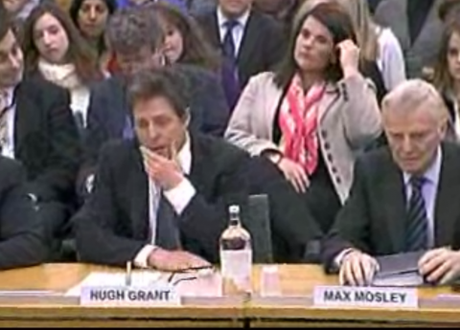
Grant and Mosley at the Joint Committee into Privacy and injunctions. Source: http://www.parliamentlive.tv/Main/Player.aspx?meetingId=9614
The scandal that threatens to destroy British journalism is still continuing apace, devolving into a he-said, she-said spectacle as Rupert Murdoch’s nearest and dearest turn on each other and celebrity types bang on about privacy.
Meanwhile, Operation Weeting, the Metropolitan Police’s investigation into hacking, is ongoing, as are Operation Tuleta, which is looking into computer misuse, and Operation Elveden, on corruption. The Leveson inquiry into media ethical standards is still sailing in full force, as is the joint Commons and Lords Committee into Privacy and Injunctions. So far, 1,800 people have come forward, expressing their fears about being hacked, reported the BBC. Claims and counterclaims within News International, the company owned by Murdoch that published the now-defunct The News of the World, are being flung around like tennis balls; and celebrities continue to bleat about their privacy. Here’s what’s happened this week:
1. Glenn Mulcaire. The private investigator at the centre of the scandal, who was employed by the News of the World, has been arrested again, held on a suspicion of conspiracy to hack voicemail messages, and perverting the course of justice. He’s been bailed, and is awaiting further investigation. He’s already been in prison for six months, in January 2007, after listening in on phones belonging to Royal Family aides.
2. Andy Coulson. The former News of the World editor, and, controversially, former press secretary to David Cameron, is suing News Group Newspapers, his former employers, over legal fees he’s run up in the phone-hacking scandal, which he claims the company should cover. He continues to deny any wrongdoing. His claims rest on the wording of his severance agreement, which doesn’t cover criminal liability; his legal counsel is arguing that News Group Newspapers should protect Coulson. News Group Newspaper’s lawyers, however, say that they have no obligation.
3. David Leigh. Leigh, an assistant editor at The Guardian, said in evidence to the Leveson inquiry that he’d hacked the phone of an arms dealer for “ethical” reasons. This has lead to the possibility of a “public interest” defence for hacking. He said, according to The Daily Mail, that there was a difference between “serious journalists” and “tabloid cockroaches” who did their hacking for mere tittle-tattle.
4. James Murdoch. The son of Rupert Murdoch, currently chairman and chief executive of News International, has written to MPs saying that former editor Rebekah Brooks settled with publicist Max Clifford over phone-hacking claims against The News of the World without his authority. Clifford received £200,000 a year for two years, and had his costs paid. Brooks has responded by saying she can’t give any more details as she is still under investigation by the police.
5. Neville Thurlbeck. A former chief reporter at The News of the World, Thurlbeck wrote to MPs. He claims that the paper’s executives withheld information about phone hacking from a parliamentary committee, and from other executives at the company – including James Murdoch. He wrote of a “backdrop of persistent non-disclosure” which means that he doesn’t believe that Murdoch was told about hacking. He claims that Tom Crone and Colin Myler, (former head of legal and former editor of the paper) who say that they did inform Murdoch about the matter, are lying. Crone, however, has insisted that he did tell Murdoch.
6. Steven Nott. A delivery driver from Cwmbran, South Wales, Nott discovered how easy it was to access other people’s voicemails in 1999 – he tried to warn police, newspapers, Vodafone, the Home Office, the Department of Trade and Industry and HM Customs and Excise – but without any success. He called up Vodafone and said that he was able to access anybody’s phone; the customer services representative replied: “Yes you could, but you’re not supposed to,” according to The Daily Mail.
7. The four amigos. “Four rich swordsmen”, said Quentin Letts in The Daily Mail, visited the Privacy and Injunctions Joint Committee – Steve Coogan, the comedian; Hugh Grant, the actor; Max Mosley, the motor-racing supremo; and Zac Goldsmith, MP for Richmond Park. They were there to complain about revelations of their sexual conduct in the press. “This was actually a private orgy,” said an “indignant” Mosley, referring to the sex party which was “exposed” by The News of the World. Goldsmith, when suggesting that newspapers published stories about celebrities in order to remain financially viable, compared them to Auschwitz. The four basically wanted some kind of privacy law, said Letts: But why, when it would help “lawyers, sado-masochistic freaks, libidinous actors and passing totalitarians?” The hearing is available online here.

